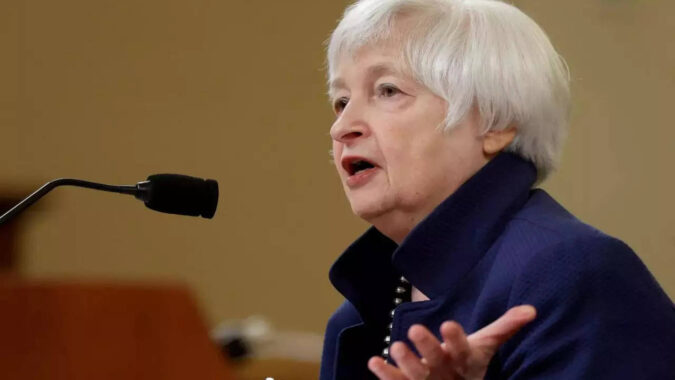BENGALURU: US Treasury Secretary Janet Yellen told Reuters on Saturday that new U.S. data showing inflation jumped unexpectedly in January signals that the fight against inflation “is not a straight line” and more work is needed.
In an interview with Reuters at a G20 finance leaders meeting in India, Yellen rejected arguments from some economists that a recession or significantly higher unemployment was needed for the Federal Reserve to win its inflation fight, sticking to her view that inflation still can be brought down while maintaining a strong labor market.
The strongest US consumer spending data in nearly two years on Friday showed that the Fed’s preferred measure of inflation, the personal consumption expenditures price index (PCE), jumped unexpectedly in January, calling into question whether the Fed remains behind in its inflation fight.
Revisions to prior data showed that previous disinflation was milder than previously reported, and that data added to financial market fears that the Federal Reserve could continue raising interest rates into summer.
“I think this report showed that it’s not going to be a straight line – disinflation is not a straight line,” Yellen said, adding that inflation “remains a problem.”
“It’s one read, but core inflation still remains at a level that’s above what’s consistent with the Fed’s objective. So, there’s more work to be done,” Yellen added.
But she said that inflation has still broadly come down over the past year and that trend should continue, because housing rental contracts were still adjusting to lower levels compared to their pandemic-era peaks.
“We see reasons for, in coming months, further declines in inflation, especially because of the importance of shelter in the overall indices,” she said.
Recession not necessary
A new study by three prominent economists released on Friday also suggested that the Fed would need a recession or significantly higher unemployment to win its inflation fight.
The authors, including J.P. Morgan chief economist Michael Feroli, Columbia Business School professor Frederic Mishkin and Brandeis International Business School professor Stephen Cecchetti, found that in 16 past instances of central bank-engineered disinflation, none occurred without a recession.
“I don’t accept that as a general statement that always has to be true,” Yellen said, joining pushback from Fed officials against the study.
She said sometimes recessions are necessary to bring inflation down, such as in the 1970s when there was a strong wage-price spiral.
“But I believe that is not the situation now,” Yellen said. “And I’ve said repeatedly and continue to believe that there is a path to bringing inflation down that would be consistent with maintaining a strong labor market.”
In an interview with Reuters at a G20 finance leaders meeting in India, Yellen rejected arguments from some economists that a recession or significantly higher unemployment was needed for the Federal Reserve to win its inflation fight, sticking to her view that inflation still can be brought down while maintaining a strong labor market.
The strongest US consumer spending data in nearly two years on Friday showed that the Fed’s preferred measure of inflation, the personal consumption expenditures price index (PCE), jumped unexpectedly in January, calling into question whether the Fed remains behind in its inflation fight.
Revisions to prior data showed that previous disinflation was milder than previously reported, and that data added to financial market fears that the Federal Reserve could continue raising interest rates into summer.
“I think this report showed that it’s not going to be a straight line – disinflation is not a straight line,” Yellen said, adding that inflation “remains a problem.”
“It’s one read, but core inflation still remains at a level that’s above what’s consistent with the Fed’s objective. So, there’s more work to be done,” Yellen added.
But she said that inflation has still broadly come down over the past year and that trend should continue, because housing rental contracts were still adjusting to lower levels compared to their pandemic-era peaks.
“We see reasons for, in coming months, further declines in inflation, especially because of the importance of shelter in the overall indices,” she said.
Recession not necessary
A new study by three prominent economists released on Friday also suggested that the Fed would need a recession or significantly higher unemployment to win its inflation fight.
The authors, including J.P. Morgan chief economist Michael Feroli, Columbia Business School professor Frederic Mishkin and Brandeis International Business School professor Stephen Cecchetti, found that in 16 past instances of central bank-engineered disinflation, none occurred without a recession.
“I don’t accept that as a general statement that always has to be true,” Yellen said, joining pushback from Fed officials against the study.
She said sometimes recessions are necessary to bring inflation down, such as in the 1970s when there was a strong wage-price spiral.
“But I believe that is not the situation now,” Yellen said. “And I’ve said repeatedly and continue to believe that there is a path to bringing inflation down that would be consistent with maintaining a strong labor market.”
